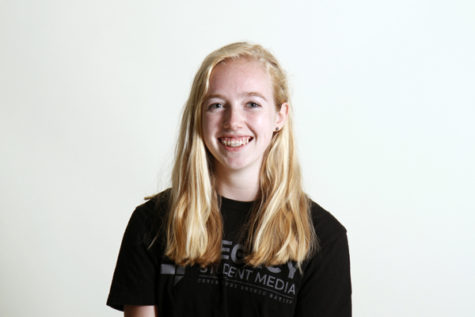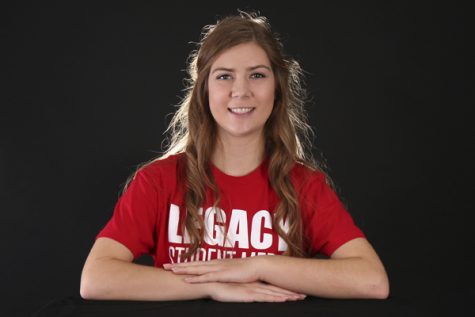With the letters shifting and floating off the paper, senior Jeff Jameson strained his eyes and focused on trying to comprehend the words in his government textbook.
Jameson fits in with the one in five students who struggle with some form of dyslexia, a learning disability characterized by a difficulty with reading and word recognition.
“For students with dyslexia, letters can switch around, like turning ‘was’ into ‘saw’ or the letters can turn backward,” Ms. Sherry Parker, reading specialist for Legacy, said.
Dyslexia can affect coordination, sense of left and right, the reversal of letters, switching letters around and problems with phonetically comprehending words. Some say the experience feels as though the letters float off of the page and rearrange themselves. CNN News has developed a simulation for what reading with dyslexia looks like to exemplify the difficulties of reading with this disorder.
“I had trouble reading in the first and second grade when we started learning how, but I was officially diagnosed with dyslexia in the third grade,” Jameson said.
Dyslexia affects ages differently. Preschoolers might have difficulty with rhyming and calling things by the right name. In elementary school, students may have trouble sounding out words and difficulty with remembering details in reading might be common. Middle schoolers with dyslexia often have a hindrance with fitting in as they are less able to pick up body language and social cues from others. For high schoolers, students might struggle with a sense of direction or memorizing vocabulary words.
“Once you discover that you have dyslexia, it never goes away,” Ms. Parker said. “We strive to give students tools to help them learn.”
Ms. Shelley Taylor wrote of her daughter’s experience with dyslexia. The book, written with Taylor Trammell’s words, describes the daily life of someone affected by dyslexia. Trammell was in seventh grade at the time, and explains how the words she read seem to “fall off of the page, or look to be on fire.” Instead of focusing on the black words on the page, Trammell’s eyes would fall to the white of the page, while the words floated around on the paper.
“It took seven years to write the book,” Ms. Taylor said. “It’s really about her life and living as a dyslexic. She was diagnosed in the first grade, but many kids might not even know why they have trouble reading.”
Trammell also has a reading disorder called Irlen’s syndrome. This condition increases sensitivity to light and makes reading black words on white paper difficult. To help with reading, colored overlays or even colored glasses can be used. For Trammell, purple overlays made the letters on the page stop “fighting” or “glowing.”
In the fifth grade, she went to get tested for Irlen’s syndrome. She and a specialist worked to mix several different shades of glass to make the perfect color combination for her to see clearly. They started with a purple tint, and worked to add or take away as many colors as needed in order for her to see the paper as white again. Four hours and five colored lenses later, Trammell walked out of the building wearing purple-tinted glasses. She was able to read more easily, with the lines no longer moving around or falling off of the page.
“I used to read books upside-down,” Trammell said. “This made my brain focus on each individual letter and helped me better focus on reading. It flipped everything upside down for me, making my dyslexic brain turn everything right-side-up and normal.”
The use of assistive technology can also be an essential tool in helping people with dyslexia read and comprehend information more efficiently. For students who struggle with reading, iPads offer the option of enlarged text, making the letters on the screen larger and easier to see. VoiceOver, enabled in the accessibility settings, reads everything on the screen aloud to the user, which can be especially useful for users with dyslexia who have trouble using and navigating their phone. Siri can also come in handy for users with spelling or writing issues, as the program can be used to dictate messages as a replacement for typing.
“We got a globe and put a pushpin in wherever we sold a book,” Ms. Taylor said. “We sold books in Egypt, Australia, Canada, places all over the world. It helped her see as a little girl that there are people all over the country and all over the world just like her.”
While at Legacy, Trammell helped implement American Sign Language into the district’s language program. During her freshmen year, MISD put a lot of emphasis on Mandarin Chinese. If reading English was a struggle for her, how could she learn Mandarin Chinese? Trammell worked with Ms. Taylor and a teacher from Martin high school to convince the district to add ASL to the choices for foreign language. So many people signed up for the course that Trammell could not even get into the course until her sophomore year.
Many famous people have dyslexia: Steven Spielberg, Albert Einstein, and over 50 percent of employees at NASA. Johnny Depp, known for his blue-tinted glasses, also has Irlen’s syndrome. The color blue helps him to better read and see his surroundings more clearly. While people with dyslexia may struggle with some educational skills, the often excel at others. Dyslexics often excel at seeing ideas with a “big picture” perspective, which helps connect ideas others who do not share this perspective might not see.
“All students have a gift,” Ms. Parker said. “Some are gifted in sports, some in fine arts, and some excel in intra or extra personal skills. My job is to find those gifts and magnify them.”





